Exploring Shopify Alternatives: Pros, Cons & Comparisons.
Based on our experience as Shopify experts
, we’ve compared Shopify with several leading eCommerce platforms to help you choose the best fit for your business.
Below, we break down where Shopify shines, where it has its challenges, and when a Shopify alternative might make more sense for your eCommerce store.

Shopify vs Squarespace
What they are in brief:
Shopify: An eCommerce platform- you build your own store, manage everything (hosting, design, checkout, apps, inventory, etc.). Shopify is fully focused on selling.
Squarespace: A website builder with eCommerce capabilities: great for visually appealing websites, blogs and small stores, but less advanced eCommerce features and scalability compared to Shopify.
Pros of Shopify (over Squarespace):
- Stronger eCommerce feature set: more apps, more payment gateways, better tools for inventory, shipping, checkout customisation.
- Better scalability: as you grow, Shopify handles more products and more SKUs better.
- Shopify has more options for SEO, growth and internationalisation.
Pros of Squarespace (over Shopify):
- Squarespace is simpler and quicker to set up; it has more polished out-of-the-box templates.
- For small product catalogues, or when design and content are more important than transactional complexity, Squarespace can be cheaper and lighter weight.
- There's less of a learning curve with Squarespace - it's very user friendly for laymen.
Squarespace vs Shopify: when Squarespace might be better…
If you have a small store with few products, and want eye-catching visual design with minimal customisation, Squarespace might be the right options for you. Similarly, if eCommerce is secondary to your goals, and you care more about content / your portfolio / branding, then Squarespace is a good start.
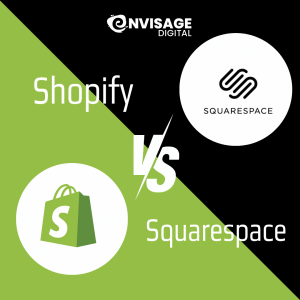
Shopify vs Etsy
What they are in brief:
Shopify is an eCommerce platform where you create and manage your own online store, handling everything from hosting and design to checkout, apps and more..
Etsy is a marketplace: your products sit alongside many others; there is existing traffic, but with far less control and specificity.
Pros of Shopify (over Etsy):
- Shopify provides complete control over branding, user experience, checkout, domain etc.
- No marketplace fees beyond payment processing; you own your customer data.
- Better ability to scale, extend functionality (apps, integrations) as you grow.
- Flexible marketing strategies; you're not constrained by Etsy’s rules or visibility algorithms.
Cons of Shopify (relative to Etsy):
- You have to drive traffic: there's no built-in audience like Etsy.
- More set-up work, more ongoing maintenance and cost (themes, apps, hosting, etc.).
- Learning curve if you want to use advanced features.
Etsy vs Shopify: when Etsy might be better…
If you’re just starting out, with few products and want minimal overhead to test market demand, Etsy could be the place for you. Similarly, if you’ve got handmade / artisan products where being part of marketplace helps discoverability, then Etsy might be the best starting place for your store.
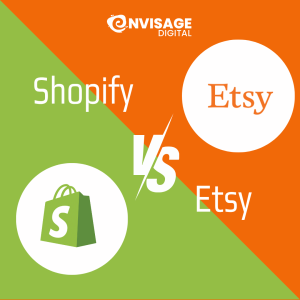
Shopify vs Wix
What they are in brief:
Shopify: An eCommerce platform: built for selling, with full control over products, checkout, apps, and analytics. Scales well for larger stores.
Wix: A website builder with eCommerce functionality: easy to design and use for small stores, but limited in advanced eCommerce features and growth potential compared to Shopify.
Pros of Shopify (over Wix):
- More robust eCommerce features (shipping, tax, apps etc.).
- Better ability to handle growth and volume.
- More reliable performance, better checkout UX.
Pros of Wix over Shopify:
- Wix can be quicker for small stores, with less technical overhead.
- Wix is often cheaper at very small scale if you use the built-in features.
- There's less dependency on many 3rd-party apps just to get started.
Wix vs Shopify: when Wix might be a good move...
Wix may be the best choice for side-hustles, very small product ranges, or when budget and simplicity matter more than expansion.
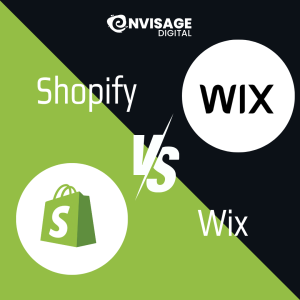
Shopify vs WooCommerce
What they are in brief:
Shopify is an all-in-one eCommerce platform: hosting, checkout, and apps included; easy to set up and maintain.
WooCommerce is a WordPress plugin for eCommerce: you need WordPress hosting, themes, and plugins. It's highly flexible and customisable but requires more technical know-how and maintenance.
Pros of Shopify (over WooCommerce):
-Fully hosted (you don’t need to manage hosting, updates, servers).
-More plug-and-play with apps, less technical configuration needed.
-Often more predictable costs for many merchants: fewer surprise costs from hosting etc.
-Strong support, stable platform, security handled by Shopify.
Pros of WooCommerce over Shopify:
-WooCommerce (on WordPress) gives more control over code, themes, checkout, data ownership.
- Potentially lower costs on certain features if you host well and manage efficiently (though costs can escalate).
-More flexibility with plugins, customisation.
WooCommerce vs Shopify: when WooCommerce might be better...
WooCommerce is probably the better option you have strong dev resources, want full control and custom functionality and have complicated blog / content alongside your eCommerce needs. Also, if you prefer open-source control or your own hosting, or want to avoid platform vendor lock-in, WooCommerce may be the right route.
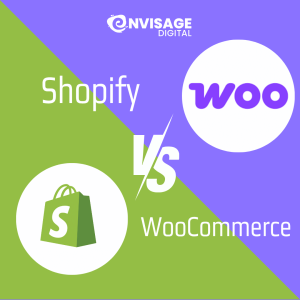
Shopify vs WordPress (non-WooCommerce use)
What they are in brief:Shopify: An eCommerce platform: focuses on selling, with all tools for online stores built in.
WordPress (non-eCommerce): A content management system: great for blogs, portfolios, or informational sites, but you need plugins (like WooCommerce) to sell products.
WordPress by itself is primarily a content / CMS system, so you'd need to add to it to make a true eCommerce solution.
Pros of Shopify over WordPress:
- Designed for eCommerce: checkout, payments, shipping etc are native.
- Out-of-the-box eCommerce feature set without heavy plugin work.
- Maintenance, security, hosting are handled; less burden on you.
Pros of WordPress (over Shopify)
- Custom setup:
WordPress can be more flexible for content, blogs, membership, custom CMS features.
- WordPress might be cheaper for content heavy sites, that feature eCommerce only as a secondary feature.
- WordPress gives you nearly unlimited customisation (though with more maintenance burden).
WordPress vs Shopify: when WordPress + custom eCommerce / plugin approach may suit...
If content (like editorial or blogging) is central to your site (e.g. magazines, news, content-led businesses), and eCommerce is secondary. If you already have a large presence / investment in WordPress and want to add store functionality rather than move away.
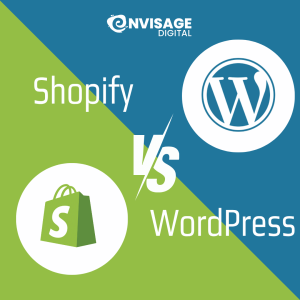
Shopify vs Shopify Plus
What they are in brief:
Shopify Standard Plans give small to medium stores full eCommerce functionality.
Shopify Plus is the enterprise/high-growth plan: with more scalability, advanced features, wholesale/B2B tools, priority support etc.
Pros of Shopify Plus (over Shopify):
- Better performance under heavy load, with better uptime and hosting infrastructure.
- More advanced APIs and integration options, alongside the ability to customise checkout and with headless commerce options.
-Wholesale / B2B features built in (so you don’t need hacks or workarounds).
- More staff accounts, more user permissions, more markets, advanced reporting, etc.
Cons / trade-offs of Shopify Plus vs Shopify standard:
- Significantly higher cost. Subscription fees are much higher with Shopify Plus.
- Shopify Plus might be overkill for smaller merchants; the complexity means more setup and management.
- Since it's designed for larger operations, some of the perks are not relevant if you're low volume or have simple needs.
Shopify Plus vs Shopify: when Plus might be better…
If you have large volume, frequent traffic spikes, complex operations (multiple markets, B2B/wholesale, high SKU counts), Plus might be the better option. Similarly, when you need enterprise-grade SLA, advanced customisation with big integrations, Shopify Plus will perform better under the load.
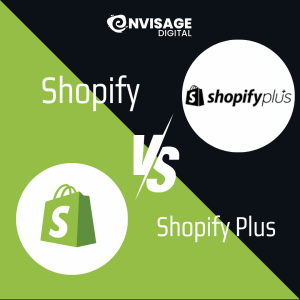
Shopify and AI: Shopify Chat GPT Instant Checkout
At the time of writing, Chat GPT is trialling it's one click checkout feature. This is currently US-only, but will shortly be available to UK users.
This exciting new feature is currently for only Etsy sites, but Shopify will be the next to follow. These innovations will make shopping faster for customers - as Chat GPT will be able to not only suggest a product, but allow you to purchase directly through GPT without having to visit another site.
Subsequently, Etsy and Shopify eCommerce stores are likely to have a big advantage over the coming months in this new form of online purchasing
| Comparison | Shopify | Alternative | When an Alternative Might Be Better |
|---|---|---|---|
| Shopify vs Squarespace | Full eCommerce, scalable, strong features | Simple setup, polished design, user-friendly | Small stores, focus on design/content |
| Shopify vs Etsy | Own store, full control, scalable | Marketplace, less setup, existing traffic | Few products, test market demand, handmade goods |
| Shopify vs Wix | Robust eCommerce, handles growth | Quick for small stores, simpler, cheaper | Small product ranges, budget/simplicity focused |
| Shopify vs WooCommerce | Hosted, plug-and-play, predictable costs | Flexible, customisable, open-source control | Strong dev resources, custom functionality |
| Shopify vs WordPress | Native eCommerce, less maintenance | Flexible content, cheaper for content-heavy sites | Content-focused, eCommerce secondary |
| Shopify vs Shopify Plus | Small-medium stores, full features | Enterprise/high-growth, advanced tools | High volume, complex operations |

Expert Take: What We Usually Recommend (Envisage Digital)
From our perspective, there’s no one-size-fits-all solution, but here’s a practical overview:
For small catalogues and limited budgets, simple product types, platforms like Shopify Standard, Wix, or Squarespace can be more than adequate. They’re easy to set up, manage, and maintain, making them ideal for small businesses or first-time sellers.
For growth, high traffic and advanced eCommerce needs: If you anticipate scaling, handling high traffic, managing complex checkout flows, or selling internationally/multi-channel, Shopify (or Shopify Plus) often strikes the best balance between cost, capability, and reliability.
For complete control and custom experiences: For businesses that require fully bespoke designs, unique workflows, or advanced integrations, WooCommerce + WordPress can work—but be prepared for higher maintenance, ongoing updates, and less predictable costs.Shopify is a solid choice here, especially considering Shopify is the next eCommerce site to feature on Chat GPT's instant checkout.
For Enterprise-level commerce: Platforms like Shopify, Magento or Adobe Commerce are designed for large-scale operations with complex product catalogs, multiple storefronts, and custom integrations. They offer maximum flexibility and power, but require significant technical expertise, infrastructure, and investment to manage effectively.
Marketplace platforms: Etsy and similar marketplaces can be excellent complementary channels. They offer built-in traffic and exposure, but are rarely suitable as your primary storefront unless your product is highly niche and visibility outweighs branding and control.

Talk to us
As official Shopify Partners, Envisage Digital has the expertise to take your Shopify store to the next level. Whether you need a full site build, custom features, or ongoing optimisation, our team is here to help.
Contact us
today and let’s create a Shopify experience that drives sales and delights your customers.
Looking to compare Shopify with some bigger eCommerce platforms? Take a look at our previous articles: Shopify vs BigCommerce
, and Shopify vs Magento
.

Latest Posts
Everything you need to become a successful eCommerce developer
Adobe has recently launched Magento 2.4.6, the most advanced version of the Magento Commerce and Open Source platform,...
Read the full blogEverything You Need to Know About the Magento 2.4.6 Update.
The day to day life of being a eCommerce developer and what it entails.
Read the full blogA Deep Dive into Magento’s Release Schedule
Dive into the heart of the Magento release schedule overhaul, uncovering its monumental shift and direct benefits for...
Read the full blog


